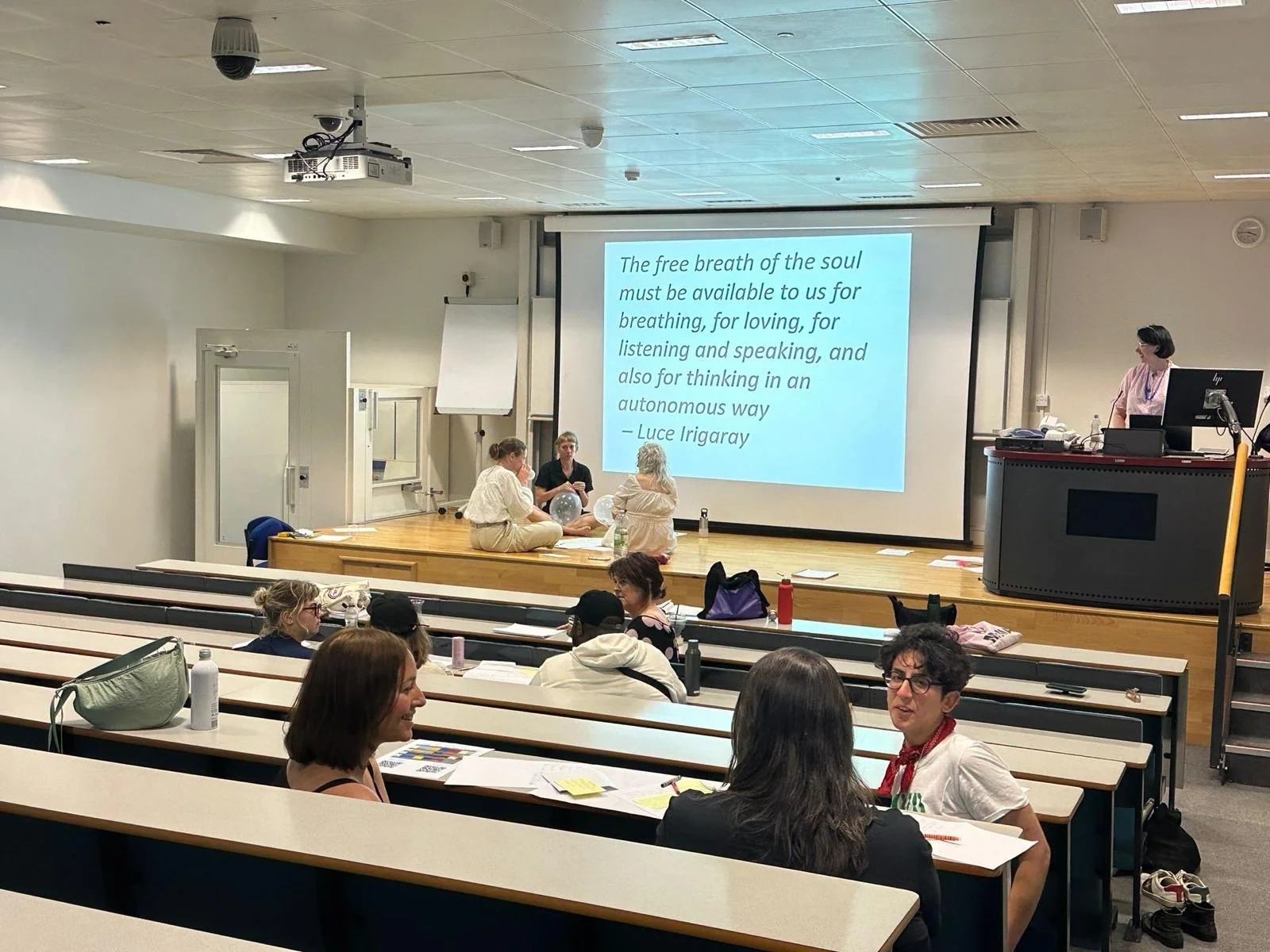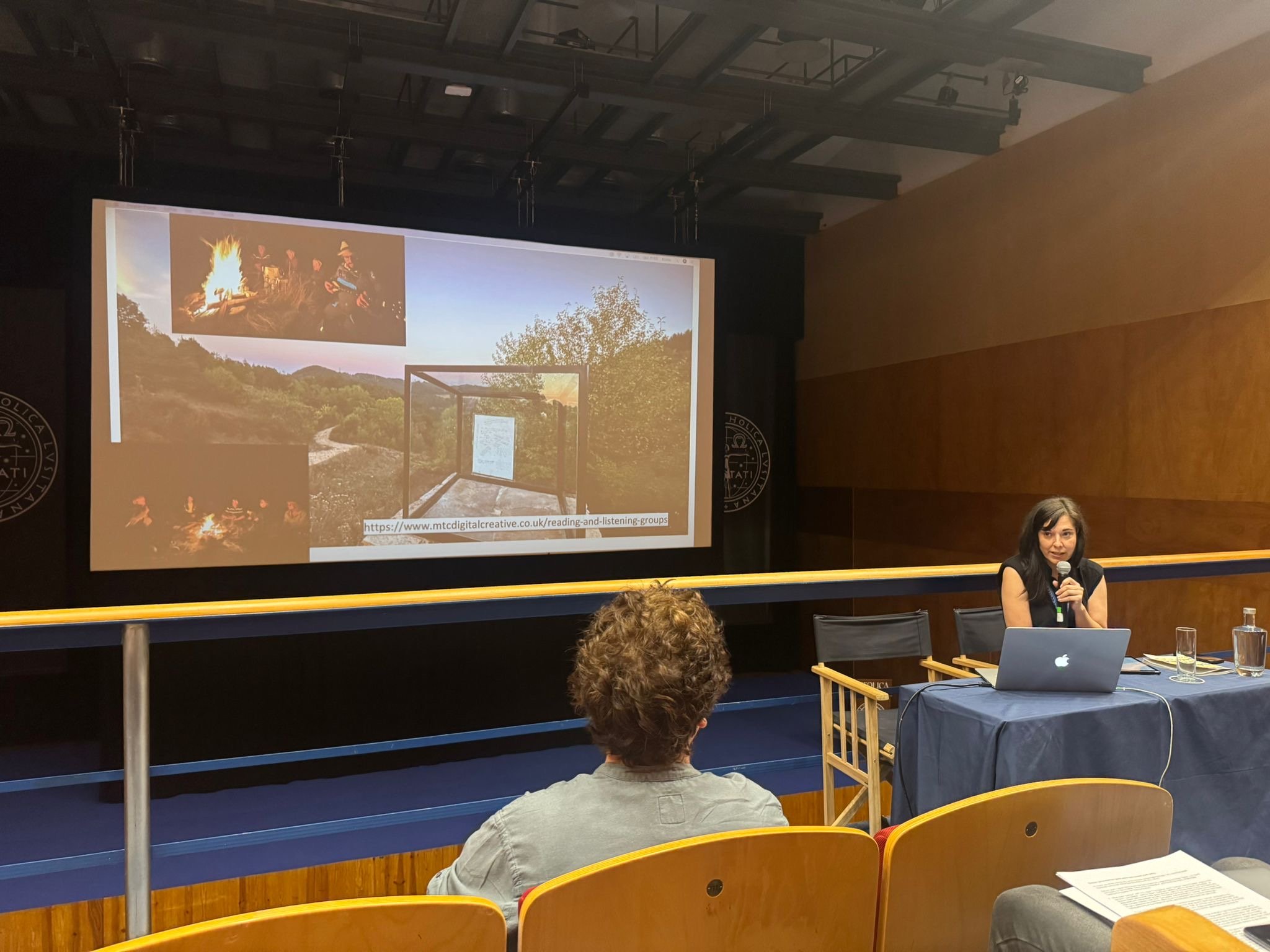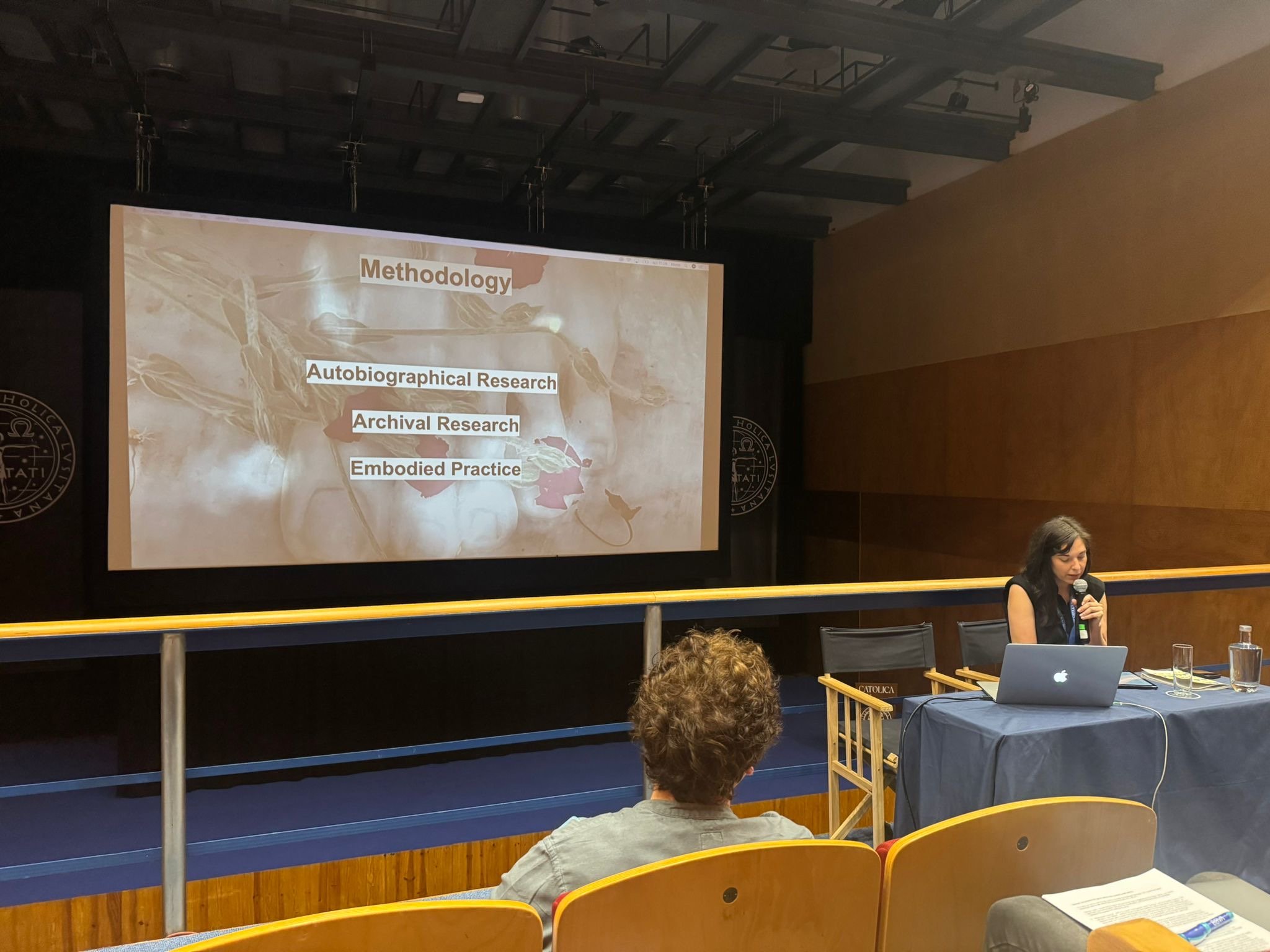Conference Papers and Presentations
In Brief
This page gathers a selection of my conference presentations that engage with my practice-based research, conscious connected breathwork, transnational feminist philosophy, and the relational politics of the maternal. Each paper is a site of staying with and preparing for the encounter — a space to think, feel, and breathe together through “histories that hurt”, and to ask how art practice, theory, and embodied practice might open space for relational transformation.
The Irish Catholic Maternal:
Articulating Embodied Research Practice with
Luce Irigaray in Response to Maternal Myth, Shame, and Ideology
Discourses on Motherhood Conference, June 27–29, 2025, LCIR Gender Studies, London
This paper argued for the critical importance of durational, embodied methodologies in navigating maternal shame and memory. It explored how the mother-daughter relation can be reimagined as transformative; moving beyond trauma to articulate new relational possibilities and disrupt inherited cycles of embodied shame.
Contributing to transnational feminisms, this research positions breath and embodied methodologies as vital tools for rethinking transgenerational shame and reclaiming maternal narratives, demonstrating the power of art practice, in dialogue with philosophy, to shape collective memory, resistance, and feminist futures.
Chair: Exploring the Masks of Motherhood: Bodies, Identity and Knowledge
As chair of the panel Exploring the Masks of Motherhood: Bodies, Identity and Knowledge, I facilitated a session that examined how maternal identity is constructed, disrupted, and refracted through cultural, scientific, and autobiographical lenses. The papers traced how maternal embodiment is entangled with inherited narratives, scientific imaginaries, and affective silences; revealing the ways motherhood is often shrouded in social expectations and epistemic gaps. Across diverse contexts, the speakers explored how knowledge about the maternal is shaped, withheld, and internalised, and how artistic and theoretical interventions can uncover the invisible labour and emotional complexity of mothering. The panel opened space for interdisciplinary reflection on how maternal experience resists capture and invites re-articulation through embodied and speculative practices.
Interweaving Embodied Practice and
Critical Theory in Transnational Feminisms
London Critical, Birkbeck University, 20-21 June
Organiser: Marie Theresa Crick:
This stream examined the potential of embodied practice as a radical site for pedagogical encounter, collective reflection, and transformative action. Grounded in Luce Irigaray’s concept of “shared air” as a relational medium, it interrogated how breath, affect, and memory move through and beyond the body to unsettle dominant narratives of trauma, silence, and historical inheritance. Drawing on feminist, decolonial, and transnational frameworks, including the work of Sara Ahmed, Achille Mbembe, adrienne maree brown, Ashon Crawley, and Fred Moten, the stream invited contributions that merged theory and practice through methods such as a breath-led workshop, archival inquiry, textual embodiment, and improvisational dialogue. It asked how embodied practice could resist abstraction, generate collective resilience, and open new pathways for situated, relational knowledge within and beyond academic settings.
PANEL ONE
Vulnerabilities, Exposed Fractures and Re-embodying
On Vulnerable Pedagogy and the Refusal of Neoliberal Abstraction
Tim Huzar
Exposed Fractures: Feminist Encounters with Archive, Landscape, and the Technocratic Eye
María Rosario Montero
Reembodying the archive: Creative critical practice in feminist archival recovery
Elise Maynard
SESSION TWO
An Embodied Exploration of Shared Air
WORKSHOP: Warm Bodies: An embodied exploration of shared air Rhona Eve Clews
UK–Ireland Digital Humanities Association Conference – Collaboration Beyond Boundaries,
Co-obrachadh thar Chrìoch, University of Glasgow (17-18 June)
This paper introduced Shared Air as a practice-based response to Irish Catholic maternal shame, memory, and relationality. Rooted in the diasporic context of Irish women in London, the research draws on Luce Irigaray’s concept of “shared air” to develop an embodied methodology that bridges performance, breathwork, and archival intervention.
Central to the presentation was the role of digital archives, including collections from the National Library of Ireland, the Radharc Film Archive, the Irish Film Institute, and the Irish Archive at London Metropolitan University. These materials, marked by silences and omissions, offer a way to trace the gaps and absences that shape transgenerational memory. Through embodied workshops and breath-led film practices, I explored how shame lingers in archival residue and how collective, sensory methods can reorient how we relate to inherited trauma.
The session reflected on how we invite participation into breath-based spaces: not only what is shared, but how, and with whom. The presentation included documentation of my own practice, alongside stills from Jesse Jones and Sarah Browne’s The Touching Contract, which continues to influence Shared Air’s curatorial ethics and feminist orientation.
The Irish Catholic Maternal:
Articulating Embodied Research Practice with
Luce Irigaray in Response to the Permanent Polycrisis
Association for Psychosocial Studies 2025 Conference – Hope and Despair / Crisis and Opportunity, St. Mary’s University, Twickenham (June 9 - June 10 2025)
This paper explored the psychosocial dimensions of the permanent polycrisis, focusing on how transgenerational embodied shame in the Irish Catholic diaspora destabilises maternal relations. Drawing on Luce Irigaray’s concept of “shared air” as both philosophical motif and embodied method, the presentation interweaves breathwork, psychoanalysis, archival fragments, and performance practice.
Through this methodology, maternal breath is reframed as a site of rupture and repair. The work invites reflection on “histories that hurt” (Ahmed), placing breath-led workshops at the centre of psychosocial inquiry. The session opened and closed with a small gestures to an embodied circular reading, opening a shared space to stay-with shame, resilience, and relational transformation as durational processes.
The Irish Catholic Maternal:
Articulating Embodied Research Practice with Luce Irigaray
Critical Intersections Symposium, King’s College London (May 2025)
Curated by Dr Timothy Huzar
I was delighted to present this paper as part of a rich and generous symposium hosted by King’s College London. My contribution was situated within a panel Embodied Research and Critical Reflexivity, and it formed part of a wider day of conversation, reflection, and academic and artistic response – including the powerful exhibition Arch & Pillar is She: De-self-colonisation by Yianna Tsolaki.
The day sparked so many rich and expansive conversations — about the work of what it means to stay in the preparedness of the encounter, staying with discomfort, about how certain encounters are never the same both ways, and about the possibilities for relationality within the university. My deepest thanks to Dr Timothy Huzar for curating the event with such care, and to respondents Fanny Söderbäck and Rachel Jones for their thoughtful reflections and generosity.
Paper Overview
"The Irish Catholic Maternal" draws from my practice-based PhD research in Visual Cultures at Goldsmiths, University of London. It explores how transgenerational shame, rooted in the Irish Catholic diaspora in London, shapes the maternal relation — particularly under the conditions of dementia, migration, and embodied memory. The work combines philosophy, breath-based performance, film, archival research, and embodied workshops to reimagine the maternal encounter as a transformative, if precarious, site of co-presence.
Philosophically grounded in Luce Irigaray’s underexamined concept of shared air, and drawing on thinkers including Catherine Malabou, Jacques Derrida, and Christina Sharpe, the paper proposes breath as both a medium of relation and a politically situated inheritance. Through auto-theoretical and practice-led methods, I engage with breath as a form of listening — to silence, to inherited trauma, and to the spaces between language and touch.
Rather than seeking resolution or redemptive closure, this work holds space for fragmentary, durational modes of relation — where co-witnessing, slowness, and attunement allow for new ways of being-with. It is a refusal of assimilation into dominant norms, and an insistence on relational, embodied, and ethically situated inquiry.
Key Themes:
Irish Catholic maternal shame and diaspora
Breath as relational method
Embodied workshops and performance
Dementia as situated and relational
Shared air, co-presence, and affective inheritance
Curating Embodied Communities:
Reorienting Maternal Narratives in the Irish Catholic Diaspora
Politics of Curatorship Spring Seminar 2025, School of Arts, Universidade Católica Portuguesa, Porto
Paper Overview
I was honoured to present my practice-based PhD research at the Politics of Curatorship Spring Seminar 2025 in Porto. It was a joy to share space with scholars, artists, and curators committed to reimagining how we think, feel, and create together.
My paper, Curating Embodied Communities: Reorienting Maternal Narratives in the Irish Catholic Diaspora, introduced key elements of my doctoral research in Visual Cultures at Goldsmiths, University of London. This research explores the intersections of transnational feminisms, embodied performance, and maternal shame within the Irish Catholic diaspora in London. Rooted in Luce Irigaray’s concept of "shared air" and in dialogue with thinkers such as Christina Sharpe and Sara Ahmed, I consider how breath can be a curatorial, relational, and political method.
In Porto, I shared parts of an ongoing project that combines philosophy, breath-based workshops, experimental film, and archival research to explore how we might remain with histories that hurt without resolving them. Through collective breath practices, circular readings, and participatory performance, the work curates what I call an ethics of co-presence — a way of listening, feeling, and staying with.
The presentation traced how breath becomes a form of embodied memory: a rhythm of shared vulnerability, situated knowledge, and refusal. It asked how we might curate differently — with slowness, with care, and with breath.
Thank you to the organisers and fellow presenters for holding such a resonant space for thinking, moving, and imagining together.
Key Themes:
Shared air and breathwork as methodology
Transgenerational shame and diaspora
Feminist curatorial practice
Maternal relationality and dementia
Non-extractive, embodied knowledge production
Upcoming Conference Presentations (2025)
Mnemonics: Network for Memory Studies Annual Conference – Memory and Responsibility
Title: Embodied Methodologies in Memory Studies: Bridging Responsibility, Reparative Action, and Ethical Narratives
Dates: September 11–13, 2025
Location: Ghent University, Belgium
Conference Website: Mnemonics 2025
Everyday Resistance: Thinking, Making, and Living in the Material World
Title: Breath as Resistance: Maternal Relationality and the Material Politics of “Shared Air”
Dates: November 7-8, 2025
Location: University of Brighton, UK











